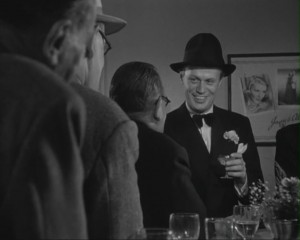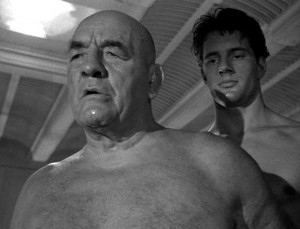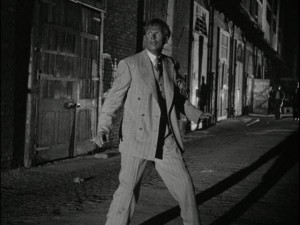Harry Fabian is probably the best at what he does, even if he is never very successful. Richard Widmark’s character in Night and the City, out now on a gorgeous new Criterion Collection Blu-ray, is a low-level con who works wherever he can, however he can, doing whatever he can to make a buck. He enters Jules Dassin’s 1950 film noir classic on the run; he will always be on the run: always hustling, always running. Sincere though his half-baked plans may be, he is perpetually—pathetically—down on his luck. He has the ambition, there’s no doubt about that, and as he shrewdly stumbles past one obstacle after another, it becomes almost humorous in the way he manages to charm his way through life, always just by the skin of his teeth. He cooks up a new scheme like other people change clothes, continually insistent that he can’t lose. But such a heedless methodology, damning the consequences of his actions and the impact on those around him, leads to a personality torn by conflicts of self-preservation, self-destruction, and self-deception. Harry incessantly lies to others, but even more frequently, he deludes himself at every turn.
Still, he never gives up or gives in. He proceeds forward, certain of his objectives and his abilities. In this unwavering perseverance, Harry is indeed without equal. His optimism and blind determination enable him to spin almost anything in his favor, even the most seemingly hopeless and useless. What’s more is that his excitement is oftentimes contagious. That’s one reason Mary Bristol (Gene Tierney) keeps hanging around, entertaining Harry’s wildly fluctuating notions and routinely bailing him out of trouble: for all of his faults, there’s still something likable about the guy.
Happening upon a wrestling match and overhearing the contemptuous comments by wrestling legend Gregorius (Stanislaus Zbyszko), who condemns the state of the sport as being beneath his protégé Nikolas (Ken Richmond), Harry finds an opening and jumps right in. Without so much as a moment’s hesitation, Harry feigns interest and knowledge in wrestling and approaches Gregorius with the prospect of entering into a business venture together, ostensibly to return wrestling to a more respectable standing (seriously). As this plays out, Harry finds himself in the midst of not just competing wrestling campaigns but a corresponding family feud. Currently ruling the business of wrestling promotion in London is Kristo (Herbert Lom), Gregorius’ son, who is himself touting his main attraction, The Strangler (Mike Mazurki). With different strategies and ideologies, Gregorius and Kristo butt heads—and Harry is always there to make the most of it.
In order to embark on his new Fabian Promotions undertaking, Harry needs financial backing. And so, while all of this wrestling/family drama is happening, Harry also gets in the middle of Helen (Googie Withers) and Philip Nosseross (Francis L. Sullivan), husband and wife owners of a “naughty” nightclub who have their own fair share of domestic issues.
As Night and the City progresses, jealously runs into greed, ambition meets deception, and one double-dealing move encounters a newly revealed double cross. Before he knows it, Harry is in over his head on any number of different fronts.
For a while though, when the wrestling project seems to take off, Harry wastes no time in gaining a cocky swagger, waltzing around as the newly minted expert on the sport and gazing lovingly at his nameplate stating “Managing Director.” Just as he always wanted, Harry has become somebody, if just in title only. As this is textbook film noir, however, it quickly becomes clear he can’t stay at the top for long. Desperation sets in and in the very individuals whom he had previously found a degree of sympathy and tolerance, he now finds impartial cons who are preoccupied by their own similarly shady wheeling and dealing.
As integral as it is to the plot of the film (and it’s an oddly unique narrative strand to be sure), wresting is really just incidental. Harry’s headlong approach toward this endeavor could have easily been replicated anywhere else in any number of undertakings. The wrestling scenes and the associated family squabbles are undeniably necessary to what transpires in the film, but that side-story, however impactful, is nonetheless the least interesting aspect of the movie, especially when compared to Harry’s more personal demons and dilemmas.
Gene Tierney, who from Laura (1944) to Leave Her to Heaven (1945) to Whirlpool (1949) had made her presence known in a string of excellent, penetrating performances, is tragically underused here. While a relatively minor character, her Mary undoubtedly still emerges as the most sympathetic. Her relationship with Harry is complex and coarse, and it’s truly painful to watch as he violently dismisses her and steals from her with an utter disregard, scorning the one person who genuinely cares for him. He attempts a degree of redemption at the film’s conclusion, but it’s too little, too late.
Widmark, on the other hand, was really just getting started with his career, and he goes all out in Night and the City. He’s working very hard here. His physically and mentally exhausting quest for “a life of ease and plenty” takes its toll (evidently so on this new Blu-ray, where the 4K restoration is so detailed that the glistening sweat on Widmark’s face is shown to be persistently streaming). Widmark is manically go go go from start to finish: excited, energetic, anxious, and expressive. Yet despite his outward confidence, his vulnerability shows through as others mock his pipe dreams that never come to fruition, and at certain points, he nearly breaks down in tears when confronted by their cruel dismissal. Everything for Harry culminates in a beautifully lit and arranged final sequence, where he is literally like a deer in the headlights as his world comes closing in.
Under suspicion during the communist witch-hunts at the time, director Jules Dassin shot Night and the City in London at the behest of Darryl F. Zanuck, head of Fox studios. Aside from being part of an international post-war deal that Hollywood had with English corporations, this was also so that Dassin could work away from the dramatics (and theatrics) of McCarthyism while still being employed by Fox. Though the postponement of personal tribulation for Dassin was in vain, Night and the City’s nontraditional film noir setting in London turned out to be ideal for the director, who had in films such as Brute Force (1947) and The Naked City (1948) exhibited a comparably concentrated use of location. Here, the noirish London alleyways are as confining as their American counterparts, the nights as menacing, lights as luminous, shadows as absorptive, the towering buildings as encroaching, and the nightclubs every bit as disreputable. Deep focus photography opens up this nocturnal world, with treachery and violence lurking behind every concealed corner. In their international application of noir imagery and themes, Dassin and German cinematographer Mutz Greenbaum compose a textured visualization of a dangerous, vibrant cityscape, and Franz Waxman’s pounding score further heightens the intensity.
That score, however, is just one element of Night and the City’s complicated post-production and distribution. Because of the aforementioned agreement between Fox and their British counterparts, two versions of the film were released, the 95-minute American version (which all of the above refers to) and the 101-minute British version, which Criterion also includes on this disc. Among the differences is a wholly distinct score for the UK cut, composed by Benjamin Frankel. There are other alterations as well: dialogue, shot design, structure, and even some character development. No matter which version you look at though, as Paul Arthur states at the opening of his essay, “Night and the City: In the Labyrinth,” “On film noir’s unparalleled roster of resonant titles—Kiss of Death, Out of the Past, and Where Danger Lives, to name three—none is more emblematic or iconographically cogent than Night and the City.”





No comments:
Post a Comment